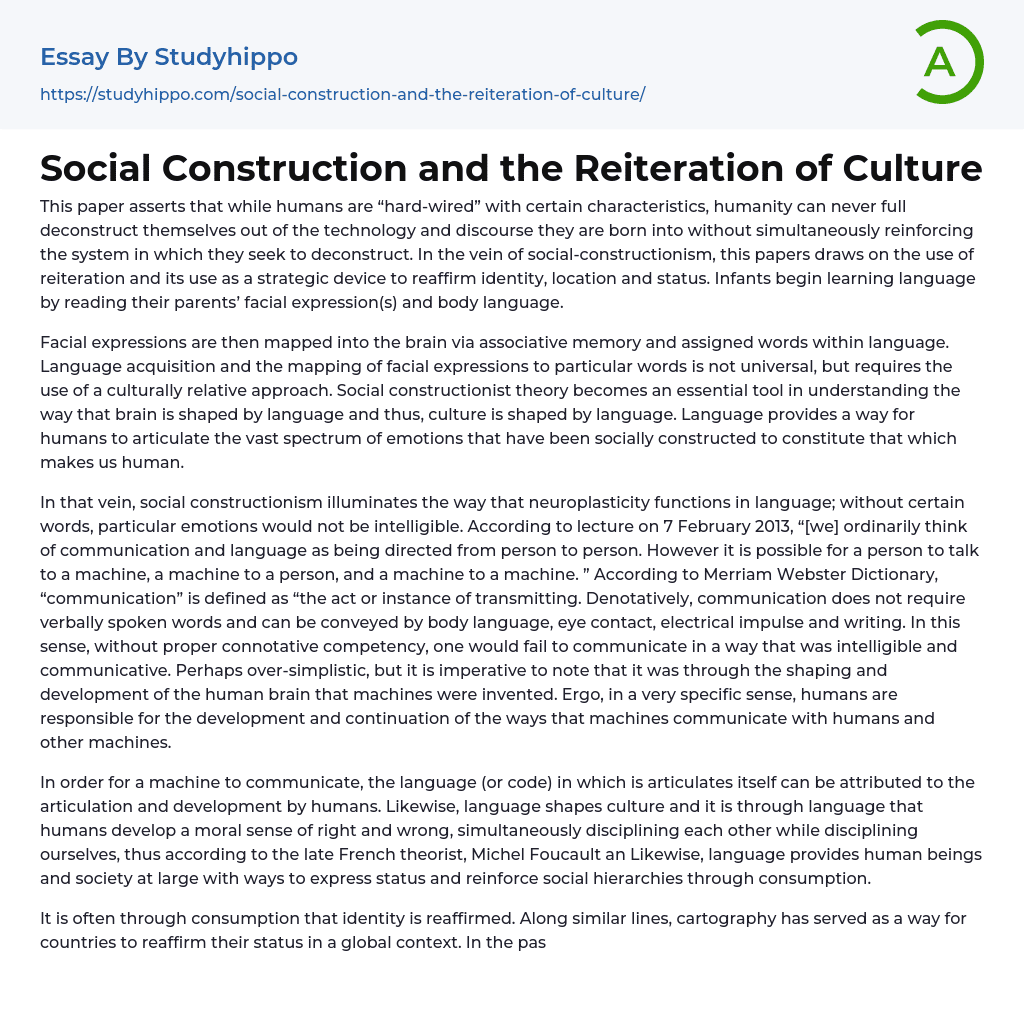

Social Construction and the Reiteration of Culture Essay Example
This paper suggests that humans cannot completely separate themselves from the technology and discourse they are born into without also supporting the system they intend to break down, despite their natural characteristics. Using social constructionism, this study strategically employs repetition to enhance identity, location, and status. Babies learn language by observing their parents' facial expressions and body language.
The brain links facial expressions to particular words in language, a process that differs for each person. To comprehend how language affects the brain and molds culture, one must understand social constructionism theory. Language allows humans to convey various emotions that are seen as essential components of human nature.
The role of neuroplasticity in language is emphasized by social constructionism, where specific words give meaning to particular emotions. In a lecture on February 7,
...2013, it was discussed that communication and language are typically perceived as interactions between individuals. However, it is also conceivable for an individual to communicate with a machine, for a machine to communicate with an individual, and even for machines to communicate with each other. As per the Merriam Webster Dictionary's definition of "communication," transmitting information involves not only spoken words but also body language, eye contact, electrical impulses, and writing. Therefore, comprehending connotation is vital for effective and meaningful communication. Although this explanation may oversimplify matters, it is crucial to recognize that human brain development played a significant part in the invention of machines. Consequently, humans bear responsibility for how machines communicate among themselves and with humans.
According to Michel Foucault, the language used by machines is created and communicated by humans. Moreover, language has a significant
impact on culture and assists humans in establishing moral values through self-discipline and disciplining others. Foucault proposes that language allows individuals and society to express their social status and reinforce hierarchical structures through consumption.
Consumption is frequently utilized to reaffirm identity, just as cartography has historically been employed by countries to validate their global status. Previously, nations have developed maps depicting their territory as larger than reality, aiming to bolster their perceived (or desired) position in terms of global power. These cartographic inaccuracies intentionally perpetuated geographical misconceptions, serving the purpose of fostering a heightened sense of nationalism and global dominance.
The connection between a country's geography and its sense of nationalism is closely tied to the language used to describe it. This link involves the brain's adaptability and communication, as language directly influences discussions about nationalism and persuasive speech. Without historical maps consistently promoting ideas of dominance and nationalism, people might have a different understanding of reality. Language helps us understand concepts like culture and nationalism, while numbers provide a universally accepted way to measure systems.
The lecture on 12 February 2013 focused on the measurement of time and its connection to distinguishing between an employer's time and an employee's personal time. In American culture, attaining an eight-hour workday has been regarded as a notable accomplishment that often demands sacrifices. This shorter workday has highlighted the distinction between an employer's time and an employee's individual time. The lecture emphasized that nowadays, time is viewed as a currency that is expended instead of merely elapsing. (Lecture 12 February 2013)
The organization of time into set blocks, like the eight-hour work-day, has enabled
society to classify various behaviors. Whether it's social or work-related, people are consistently reminded that their employer owns their time during working hours. Any personal tasks must be postponed until they're off duty. This shows how repetitive language and implied meanings in English contribute to self-discipline and workplace norms.
The idea of cultural relativism suggests that the expression "on the clock" may elicit different responses in diverse cultures, despite clocks being present in various cultures. This illustrates how language, culture, history, and the utilization of external indicators such as clocks have shaped Western notions of discipline and what is deemed appropriate. A significant element of this course was the ability to integrate scholarly concepts into my daily interactions.
By studying neuroplasticity, I gained insight into how social influences affect my behavior. Despite attending a private school, this course allowed me to reflect on my own education and have meaningful discussions with classmates who came from public schools.
Although my time at CSU Sacramento differed from that of my peers who attended public school, we shared similar socialization experiences and interpretations of accessibility across various educational backgrounds. This leads me to believe that adopting a social constructionist approach is an effective means to critique society and promote a more collective comprehension of reality.
- Building essays
- Automotive essays
- Automotive Industry essays
- Commerce essays
- Construction essays
- E Commerce essays
- Grocery stores essays
- Paper Industry essays
- Pharmaceutical industry essays
- Pharmacy essays
- Polymers essays
- Real Estate essays
- Textile Industry essays
- Bacteria essays
- Biotechnology essays
- Breeding essays
- Cell essays
- Cell Membrane essays
- Cystic Fibrosis essays
- Enzyme essays
- Human essays
- Microbiology essays
- Natural Selection essays
- Photosynthesis essays
- Plant essays
- Protein essays
- Stem Cell essays
- Viruses essays
- Activism essays
- Communism essays
- Conservatism essays
- Liberalism essays
- Marxism essays
- Nationalism essays
- Patriotism essays
- Policy essays
- Public Policy essays
- Social Contract essays
- Socialism essays
- Totalitarianism essays
- Acceptance essays
- Age Of Enlightenment essays
- Child Observation essays
- Confucianism essays
- Conscience essays
- Critical Reflection essays
- Destiny essays
- Determinism essays
- Empiricism essays
- Environmentalism essays



